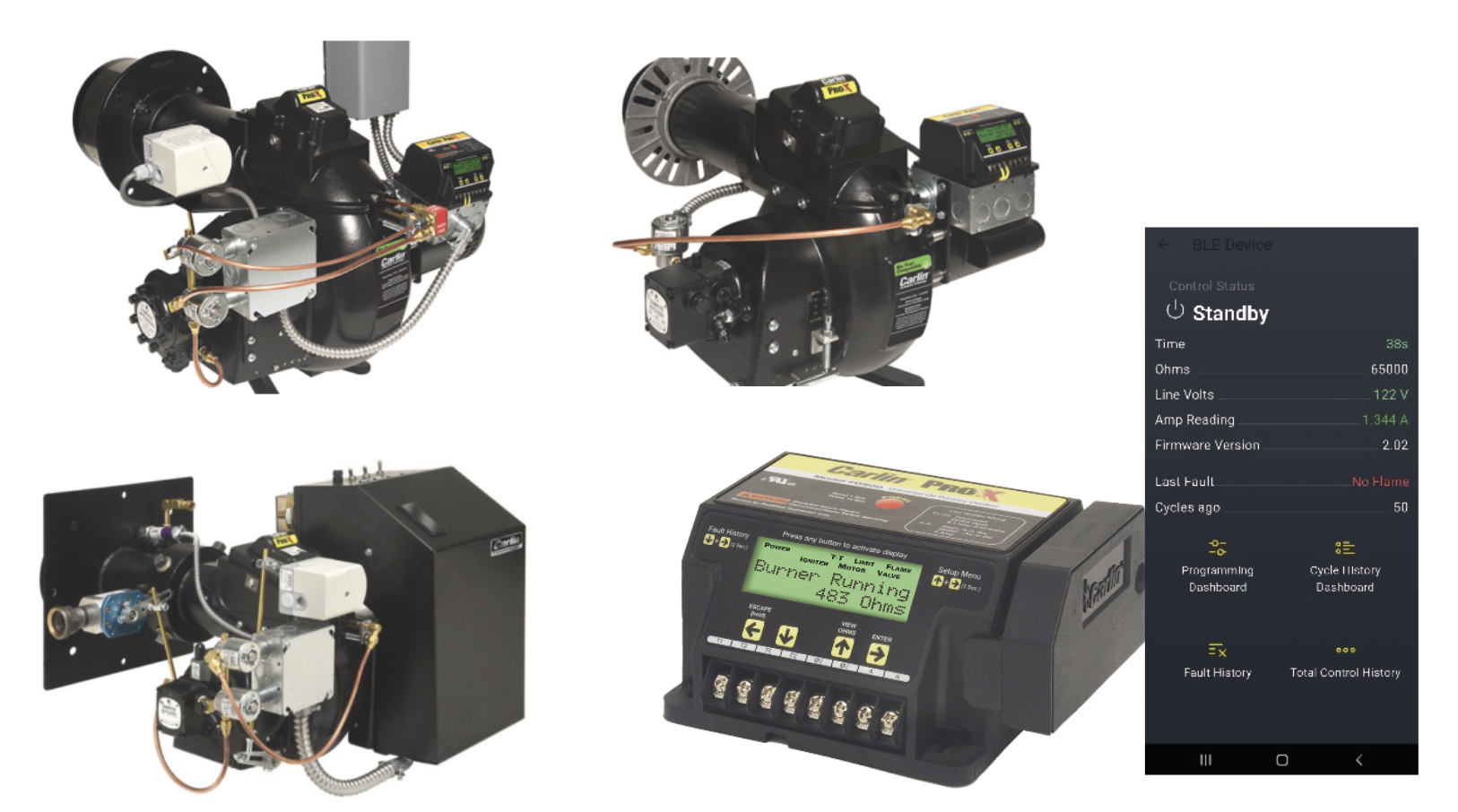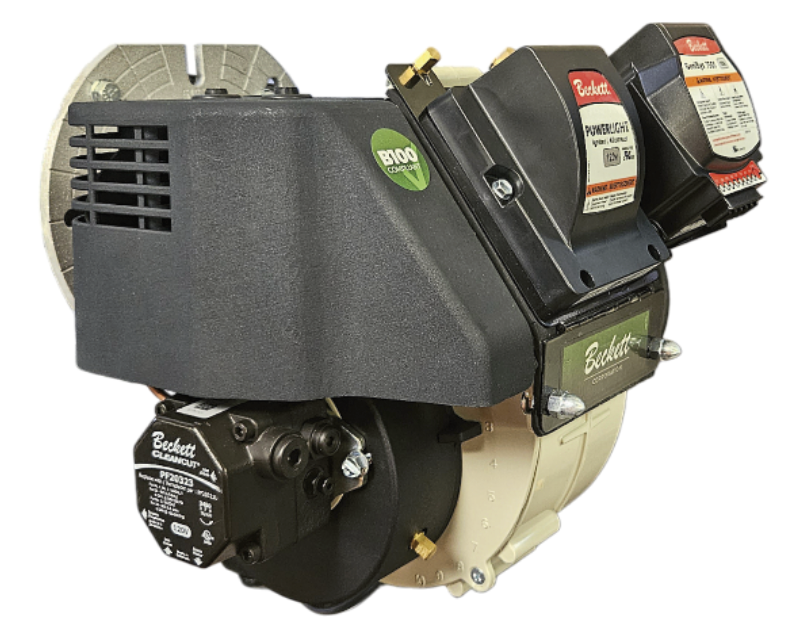Manufacturers are producing burners that make it easier to upgrade units for cleaner, lower carbon fuels
Burners are becoming fuel-flexible as they are being built to accept a broader range of biofuels and renewable diesels.
These new units are not only included in furnaces and boilers at the OEM level, but are also available to upgrade older units with a quick and inexpensive retrofit. Suddenly that 15-year-old boiler is able to burn B100 or a Renewable Diesel (RD) blend.
This is just the latest example of oil burner manufacturers leading the industry in embracing the lower carbon renewable fuels and giving the consumer autonomy over their choice of cleaner energy.
Carlin Combustion Technology: Commercial Burners Go Green
 In June, Carlin Combustion made their big announcement: all their commercial burners were now UL listed for B100 biofuels. Their residential line has been UL listed for B100 since 2023.
In June, Carlin Combustion made their big announcement: all their commercial burners were now UL listed for B100 biofuels. Their residential line has been UL listed for B100 since 2023.
The official announcement said, “These are the same Carlin burners you have come to know and rely on, now rated for biodiesel blends up to and including B100. You can burn #2, B5, B100 and any biofuel blend in between! Just as with our residential burner line, this marks the next step in the industry’s commitment to a reduced carbon environment, and we are proud to play our part.”
Carlin’s commercial line includes dual fuel burners that can be used with #2 or biodiesel and Natural Gas/Propane.
“We’ve been testing B100 on the commercial burners for years. This was obviously our next step after the residential burners,” explains Rich McElwee, V.P. Sales & Marketing for Carlin Combustion Technology and Hydrolevel Company. “We were ready to make the announcement for quite a while. We had to wait for Suntec to get their UL listing for their pumps and valves in order to make our official announcement on the commercial products.”
McElwee enthused over how “great” the testing went, especially the combustion with these burners. Furthermore, there were no component changes on the commercial products, other than changing to B100-certified pumps and valves.
When asked about integrating renewable diesel fuels, McElwee noted that they have been testing their burners with RD, and are currently participating in the NORA field testing of RD/BD blends, and look forward to rating the Carlin burners for RD100 as soon as UL has a standard for it.
Hydrolevel Company, according to McElwee, has recently introduced several new oil furnace fan controls. These direct replacement boards have easy-to-understand status LEDs, field adjustable settings, and industry standard wiring terminals and relays. The new OFC controls for PSC And ECM motors are now standard OEM equipment in several popular models, and are available through wholesale distributors for field service calls and upgrades.
Coming this fall: A new Bluetooth module and app that will plug into the existing 70200 primary controls, which are standard on most burners. Technicians will be able to use their phones to review burner settings; perform set ups; get help trouble shooting link to tech info, specs, manuals, videos, and other system information.
Carlin will be at the HEAT Show in August, with a technician track presentation on “Making Combustion Great Again,” and at booth 601.
R.W. Beckett: One Burner to Fit Them All
 The Beckett RF liquid fuel burner, released several months ago, is engineered to meet the evolving demands of modern equipment and the shift towards more sustainable fuels. Featuring the most advanced components available, the Beckett RF Burner is UL Listed for use with up to 100% biodiesel (B100) and traditional fuel oil. Beckett has rigorously tested 100% renewable diesel (R100), 100% biodiesel, and traditional fuels.
The Beckett RF liquid fuel burner, released several months ago, is engineered to meet the evolving demands of modern equipment and the shift towards more sustainable fuels. Featuring the most advanced components available, the Beckett RF Burner is UL Listed for use with up to 100% biodiesel (B100) and traditional fuel oil. Beckett has rigorously tested 100% renewable diesel (R100), 100% biodiesel, and traditional fuels.
In June, Beckett announced the discontinuation of its NX and AFII Burners. The last orders for these models will be accepted until September 30, 2025. Beckett will continue to offer key replacement parts for the AFII and NX burners.
According to Beckett’s announcement, “this transition represents our dedication to providing the most efficient, high-performing, and technologically advanced products on the market. The RF burner is engineered to surpass its predecessors with improved durability, optimized fuel efficiency, and enhanced performance—ensuring you get the best in heating
technology.”
Dr. Alan Chmiel, Director of Engineering, and Ian Lindsay, Director of Marketing, discussed the RF burner and Beckett’s Fuel Agnostic Combustion Technology (F.A.C.T.)™ process. F.A.C.T™ refers to the overall fuel/air supply and combustion process.
“Realistically, we came down to a number of things. The initial idea was that we had a number of burners, the AFII and NX, which were designed to solve one challenge, and over time we added features to address other issues, like high static pressure, sulfur removal, biodiesel. Each time we added something, it added complications to the burner and service,” explains Chmiel. “We decided to do something from the bottom up and tackle the real world issues of today with a single burner.”
That meant going back to the fundamentals, looking at the computational fluid dynamics (CFD), as well as considering the changing landscape of the industry, and how the technology available to service it, such as smart controls, changed the way they were servicing it.
Beckett developed the RF to be “super-flexible” on the fuel. This requires higher pump pressures and better atomization. The burner has best in class flame sighting. “We weren’t going to be able to do that with NX and AFII. We had to go back to scratch,” Chmiel explains.
“We went back to the first principles: what’s the best design of a burner for a stable flame, the burner head, swirl of the air, where the air would flow through the pipe. It will look simple to the end user, looks like a Beckett burner, but the underlying details are effectively redesigned around the most reliable technology to produce the most reliable flame at the end of the tube,” he continued.
Lindsay adds, “when we talk about the fuel agnosticism, out in the field, we’re seeing a range from B5 to B20, and up to B50 and B100, depending on the territory and the oil dealer. There could be differing percentages of biodiesel within a dealer’s service area. Requiring someone to go in and do a substantial setting adjustment when they first install it can be a complication many technicians are not trained to do. F.A.C.T. simplifies it, requiring minimal changes to the air setting and pump setting to adapt to different levels of biofuel.”
Beckett has also developed an OEM spec guide, based on 1,000s of hours of testing, for retrofitting systems with the new burner. The guide provides the starting points for the majority of appliances, Lindsay explained, adding that as with any retrofit, even with the OEM recommended settings for air and fuel, the technician should complete the installation with a combustion analyzer to confirm setup.
The RF allows for complete combustion across multiple fuel types, the design reduces coking on the head, increases air velocity, and allows for a stable flame base for all fuel types. The combination nozzle line assembly and air flow adjustments allow effective shaping of the flame, and the RF cad cell flame sensing tolerance is more forgiving because it is less position sensitive.
One of the biggest improvements , according to Lindsay, is that the burner comes pre-equipped for direct combustion air intake connection. The RF is built to utilize combustion air from the mechanical room or from outside. This provides an all-in-one solution, especially for technicians and companies in states that require ducted combustion air from outside.
RF burners are included in the NORA field testing of RD/BD blends, but results have not yet been provided by NORA and Dr. Butcher.
Coming soon: Updates to the myTechnician™ app. Beckett will be releasing the latest updates to its myTechnician™ app at the HEAT Show in August. Chmiel and Lindsay both reiterated that they were continually updating the app to respond to user feedback. “One of the advantages of having a software based app is that we can roll out, relatively quickly, additional tools to the app that will simplify a technician’s life and minimize time on a jobsite for trouble shooting. We can release these updates to the app stores and get them to the technicians quickly.”
Many of the upcoming features were previewed to technicians visiting the Beckett booth at the Eastern Energy Expo, and the full update will be released at the HEAT Show at booth 302/401. Alan Wornham, a Beckett technical trainer, will be leading a session on “Optimizing Liquid Fuels Service: Tools, Tips and Technologies for Today’s Technicians.”


